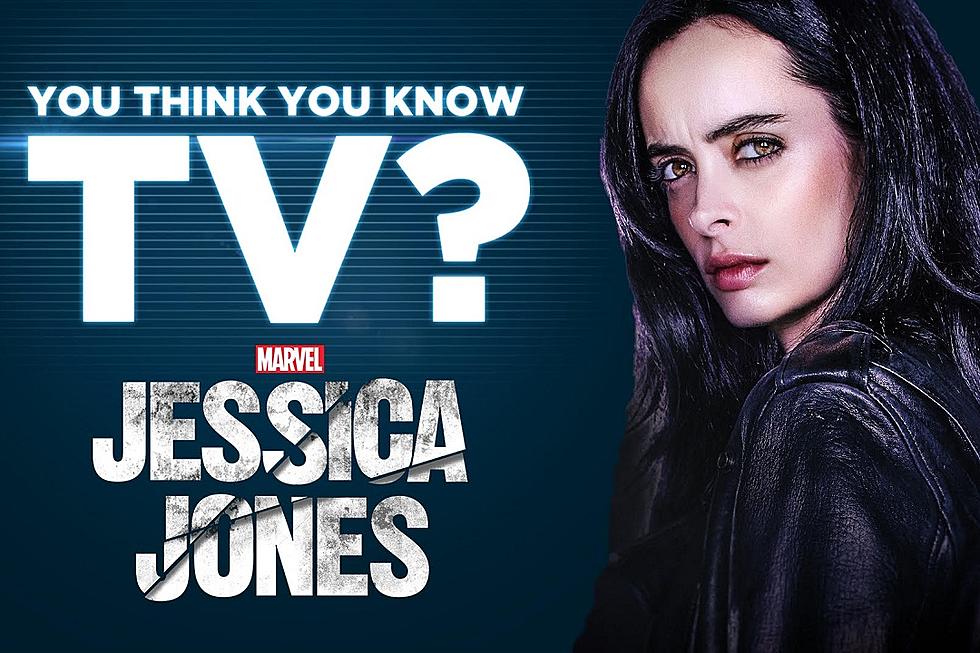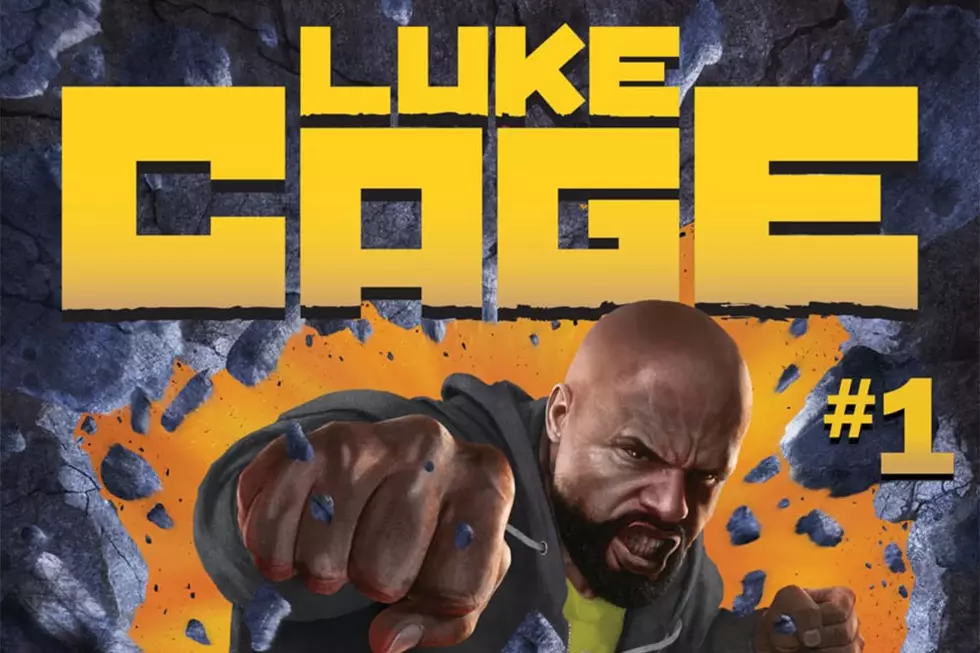![Matt Fraction on ‘Defenders': The Grand Unified Theory of the Marvel Universe [Interview]](http://townsquare.media/site/622/files/2011/11/crop-def001cvrcolpreviews.jpg?w=980&q=75)
Matt Fraction on ‘Defenders': The Grand Unified Theory of the Marvel Universe [Interview]

The Marvel Comics superteam The Defenders has always been a loose collection of superhero "outsiders" battling quasi-mystical threats, and the newest incarnation by writer Matt Fraction and artist Terry Dodson is no exception. With a roster that includes founding members Doctor Strange and Namor, Iron Fist, Silver Surfer, and Red She-Hulk, this group of flawed, damaged, and sometimes kind of creepy characters will be the last and only hope for the Marvel Universe after they discover a vast conspiracy that cuts to the very heart of Marvel mythology. The book, which Fraction says will explain "everything that has ever happened in the Marvel Universe," debuts on December 7th.
ComicsAlliance: Were you a long-time Defenders fan before you got involved in the new book?
Matt Fraction: I was not, and I think that had a lot to do with it. I have absolutely no nostalgia, no "I have to bring back Gargoyle!" I started reading it because I became a fan of [1970s Defenders writer] Steve Gerber later in life; I don't believe I ever bought a [single] issue. But finally [Editor-in-Chief] Axel [Alonso] pitched it to me, saying, "Look, this is a book where you can use all the characters that you're going to pitch us that we can't do right now. You can do your Doctor Strange. You can do your Silver Surfer." I had all this Iron Fist stuff I was trying to shoehorn into Fear Itself. Can I have Nick Fury? Great! Can I have Ant-Man? Great! In writing Fear Itself I kind of fell in love with Red She-Hulk, and I had already enjoyed writing Namor. It's all of my favorite toys in one place. I looked at a map and realized that we could turn the team into a series of Venn diagrams that covered the shape of the Marvel Universe.CA: The first issue has a combination of third-person narration and rotating first-person perspectives from different team members. Is that going to continue throughout the series?
MF: It's first person and third person, and that's going to happen every issue. Clayton Cowles, our letterer, is the MVP, because he's given [each character] their own lettering style. It's just subtle enough that you can see a difference, but not so much that it's eight different fonts. He nailed it right away! "How's this?" "Perfect." We're going to have a sort of real-time Yojimbo thing happening, where everyone's thinking their own thoughts, but then there's a kind of knowing narrator who is very informal.

CA: An omniscient narrator?
MF: Yes, but knowingly omniscient. There's a bit on the first page [of the series] where it says, "Look, I know that sounds bad, but it happened." That's just how it came out, but it felt right. It's casual.
CA: Casual god-mode.
MF: Casual god-mode. It's like somebody sitting next to you and talking to you rather than some all-knowing, all-seeing kind of thing. After this past year -- it's been five years [of full-time comics] and I'm getting antsy. After Fear Itself, which is as traditional as I can get, as suit and tie as I can manage, I wanted to build and explore. I don't think Marvel's ever done a book like this, when it gets into where it's going. We've never done this kind of stuff at Marvel.
CA: You alluded to that a bit in a Marvel panel at New York Comic Con with a very ambitious statement about how everything in the Marvel Universe that had ever happened or will happen would be explained in the book.
MF: Yup. This book is like Marvel's Grand Unification Theory.
CA: Is it going to sort of like the Illuminati storyline, where we found out retroactively that all of these events had been secretly taking place behind the scenes throughout the history of the Marvel Universe?
MF: No, it's broader. It's less about a trivial assembly of puzzle of pieces, which isn't without its own joy, but it isn't very inclusive. You don't need to know anything about anything to plug into this. There's something very pressing and very immediate about it all. I want to say it's deep, in a x/y/z planar way, and not like, "Oh, it's really smart." It's vertical and horizontal. By the end of the first storyline, there's a thread on a sweater that the Defenders have their hands on; they give it a yank, and it unfurls.

CA: In the very beginning, we see things starting to fall apart, as the membrane between reality and nightmares starts breaking down...
MF: That's more about why it's bad for Nul to be running around. It's why he's bad news. It's not just, "Oh, it's this big strong guy." He's someone whose presence is so entirely wrong that it makes planes crash and people have seizures. He's not from around here, and the thing he's looking for is this ancient, buried Marvel artifact that ends up connecting a big thing.
CA: Is this a Marvel artifact that we already know about?
MF: It depends on how big your scope of "we" is... What Nul is up to is the thread of the sweater and things get very complicated very quickly.
CA: Now, you'd also said that there's some vast conspiracy involved, which also made me think of the Illuminati.
MF: I suppose so, but the big bad behind it isn't someone we've seen before. It's not like, "this time Kang's REALLY got a plan!" ...It's not about what-if minutiae stuff. I wanted to tell a story about the root of all the Marvel myths. What if there was a reason why they happened? What if it was something that was grown and cultivated rather than this collection of stories that we happen to be looking at? I wanted to tell a story about the Marvel Universe, not about the specifics. Every now and again, a pawn gets all the way down the board and gets to upgrade. The Defenders are pawns that have accidentally made their way down the board and get to upgrade and learn a little bit more.
CA: The Defenders was pitched to me as the Marvel book that is the most like your indie work in Casanova...
MF: [Executive Editor] Tom Brevoort calls it the "Casanova Avengers"... I'm doing a creepy, f*cked up Doctor Strange love story right now. The Tom Waits/Doctor Strange song I've always wanted to do. The first time we see Doctor Strange [in Defenders] he's in bed with a girl he shouldn't be in bed with. He's a teacher who sleeps with his students. I think that crosses a line, and I also think it speaks volumes to his character. It's an interesting lack of character.

CA: Later in the same book, we're introduced to Iron Fist in almost the same situation -- in bed with the wrong woman, saying "this was a mistake."
MF: Later, Strange says, "I've been noticing all these coincidences." And that happens in the book both in ways that both Strange notices and that the reader will notice. When the plane crashes at the first page, and the plane crashes at the end of the book, the pilots have the same line. Two people say, "I hate myself and want to die." The number 23 pops up a lot. Danny's reading a comic book. It's very intricately mapped.
CA: What jumped out at me the most was this theme of making mistakes --
MF: All of these guys, with maybe the exception of Red She-Hulk, they're all kind of bummed out. They're sad people. People are making romantic mistakes. None of these people are traditional white-hat cowboys.
CA: The Defenders have always had that sort of outsider quality to them, but there's a difference between the X-Men sort of outsider, where they're just cruelly marginalized by a world that hates and fears them, and people where there's a more personal reason why they're marginalized.
MF: Yeah, it's not that you're weird, it's that you're an a**hole. With Doctor Strange, he's a little grungier, a little creepier. Doctor Strange is a creepy dude. He sleeps with his students; he crosses lines most peoples wouldn't cross. Back in Strange Tales, there are stories where he's in an ascot, waistcoat and fedora fighting wraiths in weird back alleys of unspecified Asian countries. I wanted that vibe from that first year or two of Strange Tales.
CA: The way you're describing him... With a lot of heroes, even bad boy types, there's still a level on which they feel safe. Wolverine is a killing machine, but if I hung out with him, I'd still feel safe.
MF: Wolverine has never slept with Kitty Pryde. Doctor Strange totally would. Do you know what my way into Doctor Strange was? James Spader. Would you want to be on a road trip with James Spader?
CA: Alone? I don't know.
MF: Yup. Just imagine three days in a car with James Spader. It's that "you're not from around here" feeling. He's a metric dude in a standard world. He's silently judging you constantly because he knows more than you. Silver Surfer, meanwhile... talk about a guy who's not from around here. When we first meet him, he's a field of snow. He's a guy who has watched countless planets get annihilated. That has to do something to you. He feels like Marvel's Dr. Manhattan. He doesn't see sh*t the way we see sh*t. You can tell yourself that you just need to get amongst the people and rediscover your humanity, but it's never going to happen. You're gone. They're all gone. There's not a moral person in that room, and as the team grows, it remains that way. They're damaged people, and it's like therapy.

CA: Is it about trying to "fix" that damage or just cope with it?
MF: It's about growing. There's no closure. You go forwards instead of trying to repair backwards. The biggest creeps in the Marvel Universe discover that they're the only ones who can save it, and they have to convince themselves that they are worth saving. When I came up with the idea and pitched it and wasn't laughed out of the room, my immediate question to Tom [Brevoort] was: If that's our story, why isn't their first phone call to Captain America? "Hey Avengers, guess what we found! Holy sh*t!" The nature of this conspiracy is that it hides itself. People who discover it usually can't speak of it to anyone else who hasn't seen it or been a part of it.
CA: Is it kind of like the Silence in Doctor Who -- the aliens where anyone who sees them instantly forgets the moment they look away?
MF: They don't forget it, they just physically can't talk about it. The words go away. Have you ever lost your train of thought? "I was gonna..." And then it's just gone. And everyone thinks they're weirdos anyway. They have this big, scary thing that they can't tell anyone about; they can't get help. They only have each other to solve this. And they kind of have to trick people. "Why don't you come by my house?" "Why?" "No reason! A birthday party! For... Iron Fist!" I think there's going to be an extended sequence where we see Danny trying to get Nick Fury to go somewhere -- trying to convince the most paranoid man in the world to go somewhere without telling him why. They have to find ways around it.
CA: How far have you mapped all of this out?
MF: Pretty far. I don't know. If it doesn't get done, I don't know how to get out of it. It's like what Jonathan [Hickman]'s doing with S.H.I.E.L.D. I don't know if there's a shortcut out of it. It either goes or it stops. And if it stops... "And then they never spoke of it again. The end."
CA: You've said that this story is going to be addressing the fundamental myths of the Marvel Universe, and what you love about it. What do you love about it?
MF: I love that the best heroes are also incredibly damaged. I think what makes great Marvel heroes great is that their ability and their wound is tied together. You wanna know why Uncle Ben is never going to come back? Because then there's no reason to be Spider-Man. Bring Bucky back, bring anyone else back, but the minute Uncle Ben comes back he can finally stop, because the two are tied together. At the onset of the book, these are all people who are weird and tragic; they all suffer. I love that there is no perfect vessel... I love the scope and the scale of the imagination. There's this thing when I read [Jack] Kirby comics where I kind of have to stop every five pages, and rattle my head around some idea or shape that he's drawn. I'm also writing the book Marvel Style to try and get back to that, which was kind of tricky in the first issue, which is about getting the band together.
 CA: Can you explain writing Marvel Style for people who might not be familiar with that?
CA: Can you explain writing Marvel Style for people who might not be familiar with that?
MF: All the comics used to be written that way, back when Stan Lee was writing 18 books a month. You write out plots for artists to draw. Sometimes they're very simple... even just five paragraphs for an entire comic. My script is a page for each page. Sometimes it's just four paragraphs on a page, with one for each panel. It's a learning process.
CA: This is something you chose to do?
MF: Yeah, yeah. I wanted the challenge. I got to hear [Chief Creative Officer Joe] Quesada, [Brian] Bendis, and [Jeph] Loeb kind of arguing about it one night. Joe posited the idea that the most definitive Marvel books were all done Marvel Style, and that as we move into a more writer dominated era we've lost some of the visual panache and firepower because [the scripts] are more writerly and more controlled. Versus the Marvel Style, which empowers the artist to find crescendo moments that writers might not think about it. I think Joe believe that maybe 70%, and 30% he just likes to wind Brian up. [laughs] But I started thinking about what it would be like to write Marvel Style, and I got very nervous. I was almost done with Fear Itself at the time, and I wanted to get rid of the comfort, the ease. I wanted to see what would happen. It's exciting, and it's nice to get uncomfortable again... It's much more of a trust fall.
So many books these days feel like they're on auto-pilot, with by-the-numbers predictability. And industry-wide, everyone's going down two pages. I learned to write comics in 16 pages, so 22 pages always felt pornographic. Going down to 20 is much more comfortable [for me], but it's changing everything in a real way. And there are people that realize it, and people who don't -- who say, "it's just two pages." That's 10% of a book. By the time you get to the end of six issues, that's a whole other issue you've lost. I think you're going to see people rising and falling on this. It's a very different world, a different format, a different time signature.
More From ComicsAlliance



![Touch Me, Touch Me: The ‘Sex Criminals’ Mixtape [Love & Sex Week]](http://townsquare.media/site/622/files/2017/02/Sex-Criminals-Featured.png?w=980&q=75)





